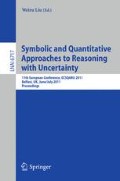Abstract
Learning Causal Bayesian Networks (CBNs) is a new line of research in the machine learning field. Within the existing works in this direction [8, 12, 13], few of them have taken into account the gain that can be expected when integrating additional knowledge during the learning process. In this paper, we present a new serendipitous strategy for learning CBNs using prior knowledge extracted from ontologies. The integration of such domain’s semantic information can be very useful to reveal new causal relations and provide the necessary knowledge to anticipate the optimal choice of experimentations. Our strategy also supports the evolving character of the semantic background by reusing the causal discoveries in order to enrich the domain ontologies.
Access this chapter
Tax calculation will be finalised at checkout
Purchases are for personal use only
Preview
Unable to display preview. Download preview PDF.
References
Ben Messaoud, M., Leray, P., Ben Amor, N.: Integrating ontological knowledge for iterative causal discovery and visualization. In: Sossai, C., Chemello, G. (eds.) ECSQARU 2009. LNCS, vol. 5590, pp. 168–179. Springer, Heidelberg (2009)
Chickering, D.M.: Learning equivalence classes of bayesian-network structures. Journal of Machine Learning Research 2, 445–498 (2002)
de Campos, L.M., Castellano, J.G.: Bayesian network learning algorithms using structural restrictions. International Journal of Approximate Reasoning, 233–254 (2007)
Devitt, A., Danev, B., Matusikova, K.: Constructing bayesian networks automatically using ontologies. In: Second Workshop on Formal Ontologies Meet Industry, FOMI 2006, Trento, Italy (2006)
Ding, Z., Peng, Y.: A probabilistic extension to ontology language OWL. In: Proceedings of the 37th Hawaii International Conference on System Sciences, HICSS 2004 (2004)
Flouris, G., Manakanatas, D., Kondylakis, H., Plexousakis, D., Antoniou, G.: Ontology change: classification and survey. The Knowledge Engineering Review 23, 117–152 (2008)
Gruber, T.R.: Towards Principles for the Design of Ontologies Used for Knowledge Sharing. International Journal Human-Computer Studies 43(5-6), 907–928 (1995)
He, Y.B., Geng, Z.: Active learning of causal networks with intervention experiments and optimal designs. JMLR 9, 2523–2547 (2008)
Jeon, B.-J., Ko, I.-Y.: Ontology-based semi-automatic construction of bayesian network models for diagnosing diseases in e-health applications. In: FBIT, pp. 595–602. IEEE Computer Society, Los Alamitos (2007)
Khattak, A.M., Latif, K., Lee, S., Lee, Y.-K.: Ontology Evolution: A Survey and Future Challenges. In: Ślzak, D., Kim, T.-h., Ma, J., Fang, W.-C., Sandnes, F.E., Kang, B.-H., Gu, B. (eds.) U- and E-Service, Science and Technology, vol. 62, pp. 68–75. Springer, Heidelberg (2009)
Meek, C.: Causal inference and causal explanation with background knowledge. In: Proceedings of the Eleventh Conference Annual Conference on Uncertainty in Artificial Intelligence (UAI 1995), pp. 403–441. Morgan Kaufmann, San Francisco (1995)
Meganck, S., Leray, P., Manderick, B.: Learning causal bayesian networks from observations and experiments: A decision theoretic approach. In: Torra, V., Narukawa, Y., Valls, A., Domingo-Ferrer, J. (eds.) MDAI 2006. LNCS (LNAI), vol. 3885, pp. 58–69. Springer, Heidelberg (2006)
Murphy, K.P.: Active learning of causal bayes net structure. Technical report, University of California, Berkeley, USA (2001)
Pearl, J.: Probabilistic Reasoning in Intelligent Systems: Networks of Plausible Inference. Morgan Kaufmann Publishers Inc., San Francisco (1988)
Pearl, J.: Causality: models, reasoning, and inference. Cambridge University Press, Cambridge (2000)
Rada, R., Mili, H., Bicknell, E., Blettner, M.: Development and application of a metric on semantic nets. IEEE Transactions on Systems, Man and Cybernetics 19(1), 17–30 (1989)
Xuan, D.N., Bellatreche, L., Pierra, G.: A versioning management model for ontology-based data warehouses. In: Tjoa, A.M., Trujillo, J. (eds.) DaWaK 2006. LNCS, vol. 4081, pp. 195–206. Springer, Heidelberg (2006)
Yang, Y., Calmet, J.: Ontobayes: An ontology-driven uncertainty model. In: International Conference on Computational Intelligence for Modelling, Control and Automation (CIMCA), pp. 457–463 (2005)
Author information
Authors and Affiliations
Editor information
Editors and Affiliations
Rights and permissions
Copyright information
© 2011 Springer-Verlag Berlin Heidelberg
About this paper
Cite this paper
Ben Messaoud, M., Leray, P., Ben Amor, N. (2011). SemCaDo: A Serendipitous Strategy for Learning Causal Bayesian Networks Using Ontologies. In: Liu, W. (eds) Symbolic and Quantitative Approaches to Reasoning with Uncertainty. ECSQARU 2011. Lecture Notes in Computer Science(), vol 6717. Springer, Berlin, Heidelberg. https://doi.org/10.1007/978-3-642-22152-1_16
Download citation
DOI: https://doi.org/10.1007/978-3-642-22152-1_16
Publisher Name: Springer, Berlin, Heidelberg
Print ISBN: 978-3-642-22151-4
Online ISBN: 978-3-642-22152-1
eBook Packages: Computer ScienceComputer Science (R0)

